Kate and Johanna’s experience on raising a child with autism spectrum disorder (ASD)
Autism spectrum disorder (ASD) refers to a lifelong developmental condition that affects the way a person behaves and often makes socialising and communicating difficult. Children on the autism spectrum have special needs.
Kate and Johanna, whose sons Phillip and Dean have autism spectrum disorder, met when their sons had a playdate in their preschool years and have been “joined at the hip ever since”. They’ve supported each other through the often challenging experience of raising a child with autism and now want to raise awareness and share their experiences with other parents.
Signs and symptoms of autism spectrum disorder
Kate said she first became concerned about her son Phillip’s development when he was about two years old. “In many ways he was a typical toddler and was starting to chat and babble as I expected him to at that age. However he focused on just a few words. These include common words like mum and dad but he was also able to absorb and comprehend words that I wouldn’t have expected a toddler to.
“We went to take a ride on Puffing Billy, a steam train, one day and as we pulled up he got very excited and started pointing at the train and yelling ‘Garratt’. I had no idea what he was saying until I spoke to my dad, who’s a train spotter. He told me a Garratt is a type of train and my son had learnt this word while they were looking at a train set together. I thought it was a bit weird that he remembered this, of all words.”
“This was about a month after I first expressed my concerns that he had autism to a maternal and child health nurse. The nurse checked his hearing and development, but said she wasn’t concerned. She told me to come back in a few months if I was still worried. Then Phillip just started talking in sentences one day, much more advanced than an average two year old. And his physical development was quite advanced, for example he started walking before other kids his age. So my concerns were allayed for a while.”
“However when Phillip started three-year kinder, I started noticing other signs. He didn’t seem to be progressing and developing as much as other children in his class and had difficulty interacting. He didn’t seem to be able to pick up on other kids’ cues, when they wanted to finish or just weren’t interested anymore. He found participating in group activities overwhelming. He also experienced separation anxiety. But his teachers and even our GP were not concerned, and it wasn’t until his second year of kinder that he was diagnosed as being on the autism spectrum, with Asperger’s syndrome.”
Johanna’s experience was quite different. “I had a normal pregnancy and textbook birth,” she said. “Dean seemed to be developing okay – he started babbling and crawling. He was a little later than some kids but was doing everything he was expected to for his age. But when he was about two years old his speech regressed, and I noticed he was behaving a bit differently to other kids.”
“For example at the mothers’ group I used to attend, he refused to play games with the other children and didn’t make eye contact. Sometimes he just didn’t respond when I called him by name. The symptoms became more obvious and even other family members noticed and started to get concerned. It was my husband that suggested we take Dean for his three-year health check a bit early, so we could talk to the nurse about autism.”
“We requested a special appointment so we knew we had time to have a proper discussion. When we got there the nurse told us she had noticed some concerning symptoms in his earlier checks and referred us to a developmental paediatrician for further assessment. This led to Dean being diagnosed with autism spectrum disorder. His initial diagnosis was pervasive developmental disorder, but the criteria changed about six months later, and based on these changes he was finally diagnosed with general autism spectrum disorder,” Johanna said.
How is autism diagnosed?
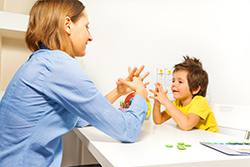 Both Johanna and Kate were referred to a developmental paediatrician, a psychologist and a speech pathologist that worked together to diagnose their children. “They do a range of different tests to assess the child’s cognitive development, physical development and working memory,” said Kate.
Both Johanna and Kate were referred to a developmental paediatrician, a psychologist and a speech pathologist that worked together to diagnose their children. “They do a range of different tests to assess the child’s cognitive development, physical development and working memory,” said Kate.
“Developmental paediatricians specialise in cognitive development so they’re a bit different to the average paediatrician,” said Johanna. “It’s really important for parents to make sure they are referred to a developmental paediatrician if their child needs to be assessed for autism. Difficulty communicating and not speaking much are common traits for kids with autism and it’s these that the speech pathologist assesses.”
“The psychologist does an IQ test to assess the child’s cognitive ability,” said Kate. “However they’re not only looking at the IQ score; some kids with autism have very high and others quite low IQs, so psychologists also look for patterns in the results. Children on the autism spectrum can often be very good at some things, but at others not very good at all, so it’s important to look for these patterns.”
“They don’t only assess the child but also ask carers to comment on their behaviour and development,” said Johanna. “For example with Dean they sent questionnaires to his carer at childcare. I was actually surprised to hear that his teachers had noticed some concerning symptoms but hadn’t mentioned them to me.”
Early intervention
“Early intervention is really important for kids on the autism spectrum. It can prepare them for school and help them lead a relatively normal, independent life. So I was keen to start an early intervention program straight away. We applied for funding assistance during the diagnosis, which took about six months,” Johanna said.
“We knew something was wrong. Dean particularly had difficulty articulating himself and his communication skills were delayed. We didn’t want to waste precious time (while waiting for funding) so we started going to a speech therapist straight away. We had to pay for that privately and it was a really challenging time for me. My second child, a baby girl, was about six months old so I was still breastfeeding. Parents and children go to speech therapist appointments together, so I went with my little boy and baby girl.”
“When Dean’s diagnosis was finally official and funding came through, we went on the waiting list to start the early intervention program. This is different from what he received at kinder, where the teachers aren’t specially trained to help children with autism develop. The early intervention program was especially designed for kids with autism; for example it had sessions focused on group skills and getting them ready to start primary school. I would go there with Dean and my baby, three afternoons a week, after kinder. That year was a blur and looking back I wonder how we all coped. But it was worth it because we had no issues when he transitioned to school.”
Different autism spectrum disorders, different behaviors
Both boys have mild autism and are considered high functioning. They both are now doing well at primary school. However general autism spectrum disorder (Dean’s diagnosis) and Asperger’s (Phillip’s diagnosis) affect children differently and Phillip and Dean experience different symptoms and behaviours.
Johanna said that, “Dean has a normal IQ but he still experiences some developmental delays and has difficulty socialising. He also had mild attention deficit hyperactivity disorder or ADHD, so some of his behaviours like hyperactive behaviour are related to this rather than autism.”
On the other hand, “Phillip didn’t experience developmental delays. He’s academically normal and in some ways very advanced for his age. For example he has specific interests that he gets really focused on and really knowledgeable about. When he was four it was dinosaurs and he didn’t just remember the complicated names but also knew which dinosaurs were from the Jurassic and other eras and was interested in DNA. So that was quite unusual for a four year old.”
“He also has a bit of difficulty socialising but he’s getting better now he’s older. Socially he’s quite an extrovert but his interactions with other kids tend to be a bit one sided and all about him. When he was younger he couldn’t understand why other children couldn’t remember or process information like he could, or that they just weren’t interested in things like DNA. Now I sometimes have difficulty coping with how intelligent it is. Like one day he noticed the milk was running out and told me we had to go to the shopping centre to buy more. It was only when we got there that I realised he had an ulterior motive, and there was something else he wanted to buy, so he’d set up the shopping trip so he could ask me to buy it for him. I’m expecting that he will keep me on my toes especially during his adolescence.”
Challenges
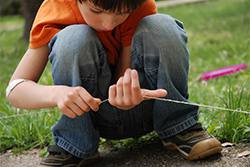 Although dealing with their boys’ behaviours can be challenging at time, Kate and Johanna agreed that the most challenging thing about raising a child on the autism spectrum is dealing with other people’s reactions to them. “There’s quite a lot of awareness about autism these days, but people don’t seem to make the connection when they see a child behaving in certain ways at the supermarket. I’ve often felt judged and like people think I’m a bad parent,” Johanna said.
Although dealing with their boys’ behaviours can be challenging at time, Kate and Johanna agreed that the most challenging thing about raising a child on the autism spectrum is dealing with other people’s reactions to them. “There’s quite a lot of awareness about autism these days, but people don’t seem to make the connection when they see a child behaving in certain ways at the supermarket. I’ve often felt judged and like people think I’m a bad parent,” Johanna said.
“For example one day, I’d had a bad day but we needed food, so I took Dean and the baby to the supermarket. He was on a high from the ADHD and he started being hyperactive. All he wanted to do was run up and down the aisles and touch things. I decided it was best just to let him go until he wore himself out, that’s often the best thing to do. But after a few minutes one of the supermarket staff came and asked me to control my child. I was getting all sorts of looks from other shoppers.”
“I wonder if any of them thought just to offer me a helping hand, for example packing the groceries in the trolley. Or wondered what was going on in our lives that might make him behave like that. But I feel like they were just judging me and my son; I was a bad parent in their eyes and he was a naughty boy, not a child on the autism spectrum with ADHD.”
“Even my GP did it once. He knew Dean had autism but got upset because he was touching things and asked me to stop him. Surely he knew that it’s just not possible to tell an autistic child to stop touching things!”
“Even at family gatherings it can be difficult,” said Joanna. “Members of my family are really understanding and supportive but I feel like I have to justify the way Dean behaves when it’s actually normal behaviour for him. They don’t realise how much effort goes into taking Dean to a family gathering. Even if he behaves perfectly while we’re out, all the concentrating and adjusting really takes it out of him. Sometimes it’s difficult the next day while he readjusts to his normal surroundings.”
Talking to kids about their autism spectrum disorder
Johanna and Kate said their sons realise they behave a little bit differently than other kids and they talk to them about that. “Dean is becoming more and more aware as he gets older that he’s different and that he can’t do some of the things other kids his age can. We talk about that and the areas that he’s struggling with. I try to emphasise that everyone is different and has different abilities,” Johanna said.
Kate also, “tries to keep it positive and talk about difference. It’s something I’ve had to do since he was diagnosed, because when he was doing early intervention he kept asking when his other friends would start. So I told him that some children have special brains and special needs and they’re the ones that go to early intervention.”
“I’ve been talking with the psychologist more recently about how best to talk to him about autism spectrum disorder. He has heard of autism, but we haven’t used that word to label his condition. Now that he’s getting older I think it’s time he started to understand he has autism.”
Relationships with family and friends
Parents of children with autism also need to talk to other adults about their child’s condition and for Kate and Johanna, it has had an impact on their relationships. “I’ve heard that having a child with autism can cause some couples to break up and I really wonder how single mothers cope,” Kate said. “My husband and I have been through this together and I can’t imagine having done it alone. There’s been some difficult times. Around the time Phillip was diagnosed I started menopause-early. I was only forty but I was getting hot flushes and having difficulty sleeping, so it really did make life difficult. But we’ve survived and I’m sure it’s strengthened our relationship.”
“My husband has also been very supportive,” Johanna said. “I think we have really strong relationships as a family. But I do feel a bit of guilt about my daughter sometimes. She’s four years old now and neuro-typical, so she has to cope with having a brother on the autism spectrum. For example she comes along to all the doctor appointments and early intervention sessions. It’s perhaps not what she’d choose to do.”
“But it’s also influenced her in really good ways. She’s very sensitive and caring towards other children and I’m sure it’s because she’s grown up around Dean. It’s wonderful to see her caring for other children but I sometimes feel like she doesn’t get as much attention as she deserves.”
The two boys still have a strong friendship with each other, and their social difficulties haven’t stopped them making other friends. “Phillip gets really focused on specific interests and tends to be attracted to other kids that are interested in the same things. His interests actually help him make friends because there’s that point of connection,” said Kate.
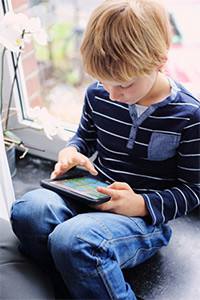 “Most recently he’s made friends playing online games. When he was playing the other night the boy he was playing against called on the phone and they ended up chatting for more than an hour! There’s a pretty widely held opinion that computer games are bad for kids, and too much of anything is. Bit in moderation I think online spaces can really help kids with autism connect to others in a way that is easier for them than going out and being in a big group. I think it’s helped Phillip develop social skills and make new friends.”
“Most recently he’s made friends playing online games. When he was playing the other night the boy he was playing against called on the phone and they ended up chatting for more than an hour! There’s a pretty widely held opinion that computer games are bad for kids, and too much of anything is. Bit in moderation I think online spaces can really help kids with autism connect to others in a way that is easier for them than going out and being in a big group. I think it’s helped Phillip develop social skills and make new friends.”
Friends are important for parents of children with autism too and Johanna said her friendships have changed a lot since Dean was diagnosed. “Being busy you don’t have so much time and some friends don’t really understand what you’re going through. So I feel like I’ve become quite selective about my friendships.”
Kate agreed but added, “I’ve made some really wonderful new friends and have really connected to other women who have children with autism. Johanna and I are joined at the hip and we’re both also good friends with another woman from our preschool who has a child with autism. She was so supportive and really helped me.”
Advice to other parents with children on the autism spectrum
“Getting support is really important; being a parent is always difficult and there are extra challenges when autism is involved,” Kate said. “I’ve found it really useful to be with other mothers who have children on the autism spectrum, because they understand what I’m going through and have experiences they can share and I learn from that.”
“When your child gets diagnosed with autism you get an information pack about the services that are available. But there’s so much going on it’s like information overload. And most of the services that are promoted are for young children. It’s much harder to find out about the services for older children, but they do exist.”
Advice to other parents
Both Kate and Johanna agreed that parents should trust their instincts if they’re concerned and think their child might have autism symptoms. “Teachers and nurses might not notice or might not tell parents they’re concerned about a child’s development. So it’s important for parents to be proactive and advocate for their child if they think something is wrong. Early intervention is really important and I do often wonder, ‘what if I had have taken Dean for assessment earlier.’ So I’d advise other parents not to delay and put it off, hoping for the best,” said Johanna.
Kate added, “Take some time out for yourself and don’t feel guilty about what you haven’t done. Be proud that you’ve raised a child with autism.”
Reference
- Raising Children Network. Autism Spectrum Disorder (ASD): Overview. 2015. [cited 8 March 2016]. Available from: [URL Link]
More information
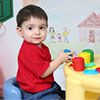 | For more information on autism – the risk factors, symptoms and treatment, see Autism. |
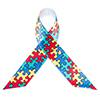 | To view Dr Joe Kosterich’s video on Autism Spectrum Sisorder (ASD), watch Autism (Video). |
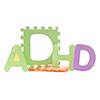 | For more information on Attention Deficit Hyperactivity Disorder in Children (Child ADHD) – the risk factors, symptoms and treatment, see Attention Deficit Hyperactivity Disorder in Children (Child ADHD). |
Dates
Tags
Created by:

 Login
Login














